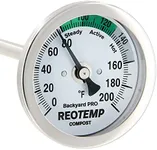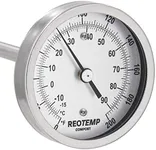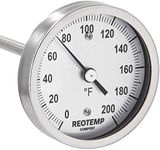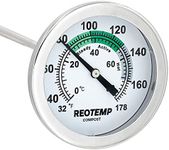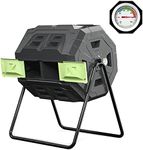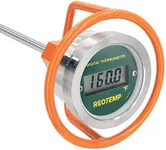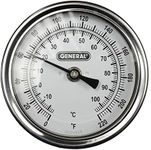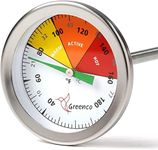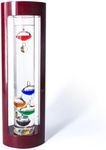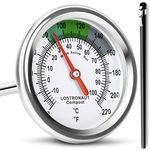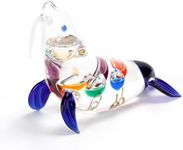Buying Guide for the Best Compost Thermometers
Choosing the right compost thermometer is essential for effective composting. A compost thermometer helps you monitor the temperature of your compost pile, ensuring that it is decomposing properly and efficiently. By keeping track of the temperature, you can make necessary adjustments to maintain optimal conditions for microbial activity, which is crucial for breaking down organic matter. Here are some key specifications to consider when selecting a compost thermometer and how to choose the best one for your needs.Temperature RangeThe temperature range of a compost thermometer indicates the minimum and maximum temperatures it can measure. This is important because different stages of composting require different temperature ranges. Typically, a good compost thermometer should measure from 0°F to 200°F (-18°C to 93°C). For beginners, a thermometer with a range of 40°F to 160°F (4°C to 71°C) is usually sufficient. If you are dealing with larger or more complex compost piles, a wider range might be necessary to monitor extreme temperatures.
Probe LengthThe probe length determines how deep you can measure the temperature inside the compost pile. This is crucial because the core temperature of the pile is what you need to monitor. Common probe lengths range from 12 inches to 36 inches. For small to medium compost piles, a 12-inch to 20-inch probe is usually adequate. For larger piles or compost bins, a longer probe, such as 24 inches or more, is recommended to reach the center of the pile.
Dial SizeThe dial size affects how easily you can read the temperature. A larger dial is generally easier to read, especially from a distance. Dial sizes typically range from 1.5 inches to 3 inches in diameter. If you have difficulty reading small print or will be checking the thermometer frequently, opt for a larger dial. For those with good eyesight or who prefer a more compact tool, a smaller dial may be sufficient.
Material and DurabilityThe material and durability of the compost thermometer are important for longevity and accuracy. Stainless steel is a common material used for probes because it is resistant to rust and corrosion, which is essential for outdoor use. The dial should also be made of durable materials that can withstand exposure to the elements. If you plan to use the thermometer frequently or in harsh conditions, look for one with a robust build and high-quality materials.
AccuracyAccuracy is crucial for ensuring that you are getting reliable temperature readings. A good compost thermometer should have an accuracy of within a few degrees. This is important for making precise adjustments to your compost pile. When choosing a thermometer, check the product specifications for accuracy ratings. For most home composting needs, an accuracy of ±2°F (±1°C) is generally sufficient. For more precise composting, look for thermometers with higher accuracy.
Ease of UseEase of use encompasses several factors, including how easy it is to insert the probe into the compost pile, how clearly the temperature is displayed, and any additional features that make the thermometer more user-friendly. Look for thermometers with ergonomic handles, clear and easy-to-read dials, and simple calibration processes. If you are new to composting, a straightforward and easy-to-use thermometer will make the process less daunting and more enjoyable.

